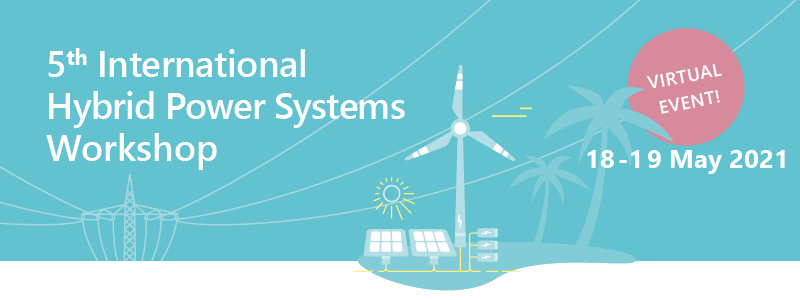Introduction to Hybrid Power Systems and Case Studies
On Monday afternoon, 17 May 2021 (13:00 – 17:30 CEST), prior to the start of the Virtual 5th Hybrid Power Systems Workshop, a virtual tutorial will be held by international experts providing a comprehensive introduction into Hybrid Power Systems as well as various case studies from around the world.
Tutorial Lecturers

Peter-Philipp Schierhorn (Energynautics, Germany), Nicholas W Miller (HickoryLedge, USA), Johannes Weide (SMA Sunbelt Energy GmbH, Germany), Dr. Thomas Ackermann (Energynautics, Germany)
Preliminary Agenda
Session 1 (120 min.)
Introduction to Hybrid Power Systems
Dr. Thomas Ackermann, Peter-Philipp Schierhorn (both Energynautics, Germany)
Energynautics CEO Dr. Thomas Ackermann and senior engineer Peter-Philipp Schierhorn will provide an introduction to the world of hybrid power systems, focusing especially on small power systems on islands or in remote areas. This session intends to give an insight into the current state of small power systems, which are typically still mainly powered by diesel generators, and the challenges and opportunities of supplementing or replacing conventional generation with renewables in such systems.
Energynautics have collected significant experience in analyzing island power systems over the past years, ranging from microgrids in the Bahamas powered by a single generator across multi-MW systems with multiple diesel power plants in Galapagos and the Seychelles to even larger island systems including small coal power plants in Indonesia. The session is targeted at participants from the renewable energy community with and without experience in hybrid power systems and will connect the theoretical foundation on small power systems with real world experience from various projects. Typical challenges of VRE integration into small power systems, such as frequency control, the accessibility of generator flexibility and the techno-economic potential of battery energy storage will be elaborated on and illustrated using real operational examples. A side focus will be on the challenges of getting hybrid power system development started in developing countries, as most small power systems worldwide fall into this category.
This session is intended to provide the technical background and an overview of hybrid power system development in different areas of the world. The application of this information will then be demonstrated by the following presenters focusing on individual projects in the respective systems.
Short Break
Session 2 (60 min.)
Case Studies from Hybrid Power Systems:
Design considerations for PV-Battery Hybrid Systems
Johannes Weide (SMA Sunbelt Energy GmbH, Germany)
The focus of this session is the robust design of PV-Battery systems in Genset based island grids. The integration of PV into genset based energy systems faces several challenges from reverse current protection of gensets to the minimum spinning reserve required for PV power fluctuations. A decently sized battery system can solve these problems and even improve the grid stability with its fast and accurate provision of active and reactive power. The right sizing of the battery system under technical and economical aspects is a multidimensional problem. A proven sizing approach that considers the technical and commercial aspects will be discussed in this session.
Short Break
Session 3 (60 min.)
Retaining Operational Flexibility and Assigning Risk with Innovative PPAs: Hawai’i’s Experience with Wind and Hybrid Solar PV and Energy Storage Projects
Nicholas W Miller (HickoryLedge, USA)
Most island systems depend on power purchase agreements (PPAs) rather than clearing markets for supply of power from variable energy resources (VERs), such as solar PV and wind, to the grid. Traditional PPAs, of typically 20 years duration, are based on energy delivered to the grid have serious deficiencies when VERs become a major contributor to the overall energy supply of a host power system. The key stakeholders in the State of Hawai’i have introduced a new PPA structure that provides substantial benefits for all key stakeholders, including investors, the grid operator, end-users and rate-payers. The lecture examines the motivations for the new structures, including consequences of more traditional PPAs and structure of the new PPAs, addressing risk allocation and management elements.
Closing
Registration
- This Hybrid Power Systems Tutorial is not included in the general participation fee of the Virtual 5th Hybrid Power Systems Workshop.
- As the number of participants for the Tutorial is limited, tickets are available on a first come, first served basis.
- The minimum number of participants is 8.
- The price is 135.00 € (excl. 19% VAT) until 19 March 2021, 170.00 € (excl. 19% VAT) until 22 April 2021 and 190.00 € (excl. 19% VAT) after that for regular participants. Students pay 120.00 € (excl. 19% VAT) when registered before 12 October 2020. Get details on our Registration & Fees webpage.
- Tutorial fees have to be invoiced with the value-added tax of the country, in which the service is provided (here: Germany).
Form of Presentation and Access
The tutorial will be held as online. Please log into the conference room at least 5 minutes before the start of each session to avoid potential connection issues. It is requested that the participants mute their microphones during the session, unless addressing the speakers. The tutorial will contain several sections to address individual questions in a timely manner.
Access links to the tutorial will be sent out before the start of the tutorial to the email address stated during registration.

